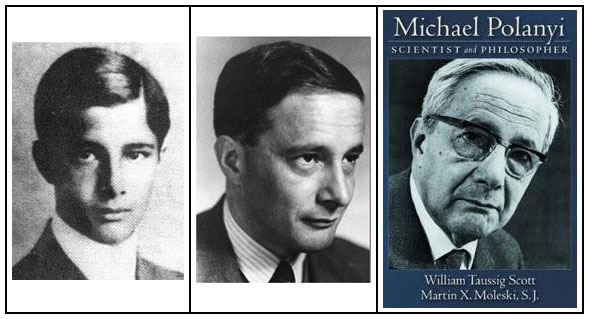Michael
Polanyi "I hear and I forget; I see and I remember; I do and I understand" Confucius Michael Polanyi (1891-1976) was a Hungarian polymath who made important theoretical contributions to physical chemistry, economics, and philosophy. He argued that positivism supplied a false account of knowing and if followed too strictly would undermine our highest achievements as human beings. In his book "Science, Faith and Society" (1946) Polanyi set out his opposition to a positivist account of science, noting that it ignores the role which personal commitments play in the practice of science. In "Personal Knowledge" (1958) Polanyi voices the idea that all knowledge claims (including those which are derived from rules) rely on personal judgments. He denied that a scientific method can yield truth mechanically since all knowing, no matter how formalized, relies upon commitments. Polanyi advocated an approach with the tenet that we believe more than we can prove and know more than we can say. According to Polanyi, a great scientist not only identifies patterns, but also chooses significant questions likely to lead to a successful resolution. Innovators risk their reputation by committing to a hypothesis. Polanyi cites the example of Copernicus, who declared that the Earth revolved around the Sun. He claimed that Copernicus arrived at the Earth's true relation to the Sun not as a consequence of following a method, but via "the greater intellectual satisfaction he derived from the celestial panorama as seen from the Sun instead of the Earth." Polanyi’s writings on the practice of science influenced Thomas Kuhn and Paul Feyerabend. Polanyi rejected the claim by British Empiricists that experience can be reduced into sense data. It was while writing Personal Knowledge that he identified the "structure of tacit knowing" (Implicit Knowledge). He viewed it as his most important discovery. He claimed that we experience the world by integrating our subsidiary awareness into a focal awareness. "Our tacit awareness connects us, albeit fallibly, with reality. It supplies us with the context within which our articulations have meaning". In "Life's irreducible structure" (1968), Polanyi argued that the information contained in the DNA molecule is not reducible to the laws of physics and chemistry. Although a DNA molecule cannot exist without physical properties, these properties are constrained by higher-level ordering principles. In "Transcendence and Self-transcendence" (1970), Polanyi criticized the mechanistic world view that modern science inherited from Galileo.
|
